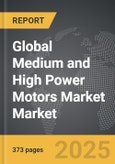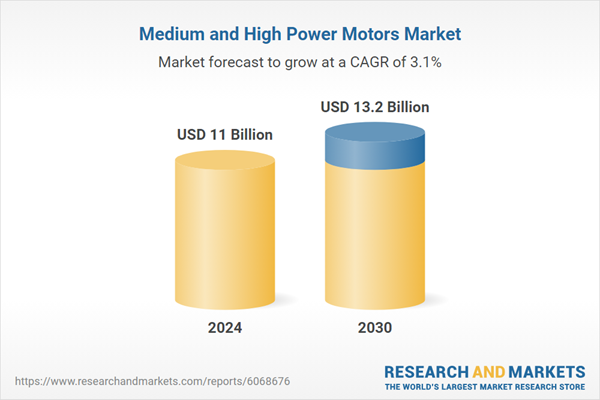Global Medium and High Power Motors Market - Key Trends & Drivers Summarized
Medium and High Power Motors: The Driving Force Behind Industrial Evolution
Medium and high power motors are indispensable in various industries, including manufacturing, transportation, energy, and infrastructure. These motors, typically ranging from 1 MW to several hundred megawatts, are crucial for applications requiring high torque, efficiency, and reliability. With the increasing demand for automation, electrification, and industrial sustainability, the market for these motors is undergoing significant transformation. Technological advancements such as the adoption of high-efficiency motor designs, smart monitoring systems, and improved insulation materials are redefining the performance and longevity of these motors. Additionally, regulatory standards focused on reducing carbon emissions and energy consumption are pushing industries to adopt next-generation electric motors that offer higher efficiency with lower operational costs.A key trend shaping the medium and high power motor market is the rapid shift towards electrification in traditionally fossil-fuel-dependent industries. The transportation sector, especially rail and marine applications, is increasingly relying on high-power electric motors to replace diesel-powered engines, improving both efficiency and environmental sustainability. In manufacturing, automation and Industry 4.0 are fueling demand for smart motors with advanced sensors and IoT integration, enabling real-time performance monitoring, predictive maintenance, and operational optimization. Furthermore, advancements in materials such as high-temperature superconductors and permanent magnet motors are enhancing power density, reducing size, and improving efficiency, making them ideal for modern industrial applications.
What Are the Latest Technological Advancements Redefining the Market?
One of the most groundbreaking innovations in the medium and high power motor market is the integration of digital technologies. Smart motors embedded with IoT sensors are now capable of transmitting real-time operational data, enabling predictive maintenance and reducing downtime. This trend is particularly vital for industries like oil & gas, power generation, and mining, where unexpected motor failures can lead to substantial financial losses. Additionally, the development of high-efficiency synchronous motors, including permanent magnet synchronous motors (PMSMs) and reluctance motors, is gaining traction due to their ability to reduce energy consumption by up to 30% compared to traditional induction motors.Material advancements are also playing a crucial role in transforming motor efficiency and longevity. The use of silicon carbide (SiC) and gallium nitride (GaN) semiconductors in motor drives is leading to higher switching frequencies and reduced power losses, making motors more efficient and compact. Furthermore, the rise of superconducting motors, which utilize superconducting windings to achieve near-zero electrical resistance, is promising revolutionary improvements in energy efficiency and power density. These developments, coupled with improvements in cooling technologies, such as liquid-cooled motor systems, are allowing manufacturers to design motors with higher power outputs while maintaining compact form factors, catering to industries with space constraints.
How Are End-Use Industries Shaping Market Dynamics?
The end-use landscape of medium and high power motors is evolving rapidly, driven by the demands of key industries such as energy, transportation, manufacturing, and water treatment. The renewable energy sector is one of the most significant adopters of high-power motors, with wind and hydroelectric power plants relying heavily on them for power generation and distribution. As global investments in renewable energy projects continue to rise, the demand for high-efficiency motors capable of handling variable loads and high torque applications is expected to surge. Similarly, the oil & gas industry is witnessing increased deployment of explosion-proof motors designed to operate in hazardous environments, ensuring operational safety and reliability.In transportation, electric and hybrid locomotives, ships, and heavy-duty commercial vehicles are integrating high power motors to replace conventional internal combustion engines. The shift toward electric propulsion systems in marine and rail industries is not only reducing carbon footprints but also enhancing efficiency and reliability. Meanwhile, smart factories and industrial automation are accelerating the adoption of medium power motors in robotic systems, conveyor belts, and precision machining, making operations more streamlined and energy-efficient. The water treatment and desalination sector is another growing market, where high power motors are being deployed for large-scale pumping and filtration processes, addressing the increasing global demand for clean water.
What Is Driving the Exponential Growth in the Market?
The growth in the medium and high power motor market is driven by several factors, with industrial electrification and sustainability taking center stage. Governments and corporations worldwide are increasingly prioritizing energy-efficient solutions, prompting stricter regulatory standards on motor efficiency. Policies such as the European Union's Ecodesign Directive, the U.S. Department of Energy (DOE) efficiency regulations, and China's Minimum Energy Performance Standards (MEPS) are pushing industries to replace outdated motors with high-efficiency models, stimulating market expansion. Additionally, the rise of green hydrogen production, which relies on high-power electric motors for electrolysis, is contributing to market growth as countries aim for carbon-neutral energy sources.The surge in automation and Industry 4.0 adoption across various industries is further accelerating the demand for intelligent motor systems equipped with real-time monitoring and AI-driven analytics. As factories become more digitized, companies are investing in motors that not only reduce energy consumption but also provide advanced diagnostics and remote operational capabilities. The increasing focus on electric transportation, including the deployment of electric buses, trains, and even electric-powered aircraft, is also a key driver, pushing manufacturers to innovate high-performance motor solutions. Furthermore, growing infrastructure development projects, particularly in emerging economies, are driving demand for high-power motors in construction, mining, and HVAC applications. With continuous advancements in motor technology and increasing investments in electrification, the medium and high power motor market is poised for sustained expansion in the coming years.
Report Scope
The report analyzes the Medium and High Power Motors market, presented in terms of market value (US$). The analysis covers the key segments and geographic regions outlined below:- Segments: Product (AC Motor, Single Phase, Three Phase, DC Motor); Voltage (Medium Voltage, High Voltage); Application (Automotive, HVAC Equipment, Industrial Machinery, Aerospace & Transportation, Commercial).
- Geographic Regions/Countries: World; United States; Canada; Japan; China; Europe (France; Germany; Italy; United Kingdom; Spain; Russia; and Rest of Europe); Asia-Pacific (Australia; India; South Korea; and Rest of Asia-Pacific); Latin America (Argentina; Brazil; Mexico; and Rest of Latin America); Middle East (Iran; Israel; Saudi Arabia; United Arab Emirates; and Rest of Middle East); and Africa.
Key Insights:
- Market Growth: Understand the significant growth trajectory of the AC Motor segment, which is expected to reach US$7 Billion by 2030 with a CAGR of a 3.2%. The Single Phase Motor segment is also set to grow at 2.9% CAGR over the analysis period.
- Regional Analysis: Gain insights into the U.S. market, valued at $3 Billion in 2024, and China, forecasted to grow at an impressive 5.8% CAGR to reach $2.6 Billion by 2030. Discover growth trends in other key regions, including Japan, Canada, Germany, and the Asia-Pacific.
Why You Should Buy This Report:
- Detailed Market Analysis: Access a thorough analysis of the Global Medium and High Power Motors Market, covering all major geographic regions and market segments.
- Competitive Insights: Get an overview of the competitive landscape, including the market presence of major players across different geographies.
- Future Trends and Drivers: Understand the key trends and drivers shaping the future of the Global Medium and High Power Motors Market.
- Actionable Insights: Benefit from actionable insights that can help you identify new revenue opportunities and make strategic business decisions.
Key Questions Answered:
- How is the Global Medium and High Power Motors Market expected to evolve by 2030?
- What are the main drivers and restraints affecting the market?
- Which market segments will grow the most over the forecast period?
- How will market shares for different regions and segments change by 2030?
- Who are the leading players in the market, and what are their prospects?
Report Features:
- Comprehensive Market Data: Independent analysis of annual sales and market forecasts in US$ Million from 2024 to 2030.
- In-Depth Regional Analysis: Detailed insights into key markets, including the U.S., China, Japan, Canada, Europe, Asia-Pacific, Latin America, Middle East, and Africa.
- Company Profiles: Coverage of players such as ABB Ltd., Allied Motion Technologies Inc., Ametek Inc., ARC Systems Inc., Asmo Co. Ltd. and more.
- Complimentary Updates: Receive free report updates for one year to keep you informed of the latest market developments.
Some of the 34 companies featured in this Medium and High Power Motors market report include:
- ABB Ltd.
- Allied Motion Technologies Inc.
- Ametek Inc.
- ARC Systems Inc.
- Asmo Co. Ltd.
- Baldor Electric Company Inc.
- Brook Crompton UK Ltd.
- Danaher Motion LLC
- Franklin Electric Co. Inc.
- General Electric Corporation
- Hyundai Heavy Industries
- Johnson Electric Holdings Ltd.
- Nidec Corporation
- Regal Beloit Corporation
- Rockwell Automation Inc.
- Shandong Huali Electric Motor Group
- Siemens AG
- TECO Electric & Machinery Co. Ltd.
- Toshiba Corporation
- WEG S.A.
This edition integrates the latest global trade and economic shifts into comprehensive market analysis. Key updates include:
- Tariff and Trade Impact: Insights into global tariff negotiations across 180+ countries, with analysis of supply chain turbulence, sourcing disruptions, and geographic realignment. Special focus on 2025 as a pivotal year for trade tensions, including updated perspectives on the Trump-era tariffs.
- Adjusted Forecasts and Analytics: Revised global and regional market forecasts through 2030, incorporating tariff effects, economic uncertainty, and structural changes in globalization. Includes historical analysis from 2015 to 2023.
- Strategic Market Dynamics: Evaluation of revised market prospects, regional outlooks, and key economic indicators such as population and urbanization trends.
- Innovation & Technology Trends: Latest developments in product and process innovation, emerging technologies, and key industry drivers shaping the competitive landscape.
- Competitive Intelligence: Updated global market share estimates for 2025, competitive positioning of major players (Strong/Active/Niche/Trivial), and refined focus on leading global brands and core players.
- Expert Insight & Commentary: Strategic analysis from economists, trade experts, and domain specialists to contextualize market shifts and identify emerging opportunities.
Table of Contents
Companies Mentioned (Partial List)
A selection of companies mentioned in this report includes, but is not limited to:
- ABB Ltd.
- Allied Motion Technologies Inc.
- Ametek Inc.
- ARC Systems Inc.
- Asmo Co. Ltd.
- Baldor Electric Company Inc.
- Brook Crompton UK Ltd.
- Danaher Motion LLC
- Franklin Electric Co. Inc.
- General Electric Corporation
- Hyundai Heavy Industries
- Johnson Electric Holdings Ltd.
- Nidec Corporation
- Regal Beloit Corporation
- Rockwell Automation Inc.
- Shandong Huali Electric Motor Group
- Siemens AG
- TECO Electric & Machinery Co. Ltd.
- Toshiba Corporation
- WEG S.A.
Table Information
| Report Attribute | Details |
|---|---|
| No. of Pages | 373 |
| Published | February 2026 |
| Forecast Period | 2024 - 2030 |
| Estimated Market Value ( USD | $ 11 Billion |
| Forecasted Market Value ( USD | $ 13.2 Billion |
| Compound Annual Growth Rate | 3.1% |
| Regions Covered | Global |









